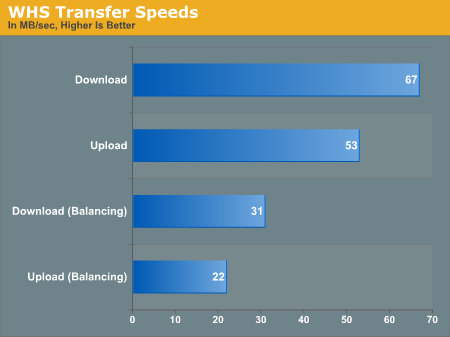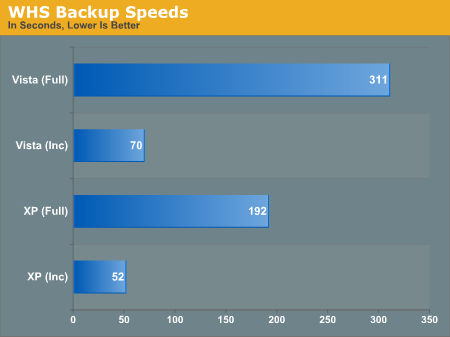A New Kind of Home Computer: Windows Home Server Preview
by Ryan Smith on September 4, 2007 1:00 PM EST- Posted in
- Systems
Performance Data
Because we were only able to get our hands on a release candidate version of WHS for the performance testing, all the results here need to be taken with a grain of salt. The WHS RC is quite good, especially in comparison to rockier launches like Vista, but we expect the performance numbers in particular to have changed slightly between the RC and the final version.
It's worth noting that the network packet throttling problem with Vista is still in play as of this writing. As a result all of our tests are under Windows XP SP2 unless otherwise noted, and when they're run on Vista it is with Multimedia Class Scheduler Service disabled to prevent throttling. Although this problem has existed in Vista since it has shipped, this is about the worst time it could come to light for Microsoft. Until it's fixed, Vista users wanting to move their media off of a personal computer and onto a WHS server will definitely want to hold off on doing so. Even though the problem with throttling isn't one with WHS, the problem occurring in Vista still drags down WHS.
| Client Test Bed | |
| Processor | Intel Core 2 Quad QX6850 (3.00GHz/1333MHz) |
| RAM | G.Skill DDR2-800 (2x2GB) |
| Motherboard | Gigabyte GA-P35-DR3R (Intel P35) |
| System Platform Drivers | Intel 8.1.1.1012 |
| Hard Drive | Maxtor MaXLine Pro 500GB SATA |
| Video Cards | 1 x GeForce 8800GTX |
| Video Drivers | NV ForceWare 163.44 |
| Power Supply | OCZ GameXStream 700W |
| Desktop Resolution | 1600x1200 |
| Operating Systems | Windows Vista Ultimate 32-Bit Windows XP SP2 |
| . | |
| Server Test Bed | |
| Processor | AMD Athlon X2 4600+ (2.40GHz/400MHz) |
| RAM | OCZ DDR-400 (4x512MB) |
| Motherboard | ASUS A8N-SLI Premium (nForce 4 SLI) |
| System Platform Drivers | NV 6.69 |
| Hard Drive | 2x Western Digital Caviar Raid Edition 2(400GB) |
| Power Supply | OCZ GameXStream 700W |
| Operating Systems | Windows Home Server RC |
| . | |
We'll start with testing WHS's file server abilities by transferring files back and forth. With a gigabit network, the bottleneck will be the transfer abilities of our hard drives, so if WHS is achieving maximum performance it should be able to move data at speeds around the maximum of our hard drives. We'll be using a RAM disk on the client side to isolate the performance of WHS.
Also on this graph will be the performance of WHS while attempting to do file transfers in the middle of a balancing operation. Because of the importance in balancing data for data retention and performance reasons, WHS will sometimes need to balance folders even during times of backups and file transfers. This doesn't seem very common in our use since it's related to total use of the WHS server, but it needs to be noted all the same. WHS does seem to take steps to avoid balancing during heavy use when possible.

At 53MB/sec up and 67MB/sec down, the results are very close to those that we've seen WD RAID edition hard drives do previously. For users with gigabit networks, it looks like it's very possible for WHS to offer performance virtually equal to having the drives installed locally. Speeds while balancing aren't very impressive though, not that we expected them to be.
The other metric of WHS's performance is how it handles backups. Unlike pure file transfers, backups aren't "brain-dead" operations and require work on behalf of both the server and the client. The client needs to figure out what data is to be sent to the server, and the server is responsible for keeping all of that data organized and compressed. WHS backup performance is also heavily dependent on what else is already in the backup cache, because WHS avoids backing up anything redundant down to the cluster level.
These specific tests were run with empty caches as a worst-case scenario; actual performance of the initial backup on a new machine (as long as it's not the first machine) should be faster. These tests are being done on clean Windows installations, with the second "incremental" backup being done immediately after the first backup completes. This is more optimistic than a real incremental backup since virtually no data changes, but in doing it this way we can establish a floor for approximately how long the scan process takes. The reference sizes for these installations are 2.3GB for XP and 5.4GB for Vista, after factoring out the system page file and other files that WHS backup filters out.

Both Vista and XP turn in respectable, although not amazing backup times. Using the incremental backup as the baseline, we achieved an average backup speed of about 20MB/sec. This is well below what we've seen on our file transfer tests, but still fast enough to complete these backups in a short amount of time; since WHS doesn't have any true peers we don't have anything else to properly compare it to. In an actual deployment with real incremental backups and common data, we expect the results to be a lot closer to that of the incremental times.
We also took the liberty of backing up the XP machine again once the Vista machine was backed up in order to measure the size of the backup cache on the WHS server. Even with these clean installs, there's about 2GB of savings on the WHS server; 7.7GB of data is only taking up 5.7GB of space. Like Previous Versions on Vista, these savings should grow as more data is added to the backup cache.










128 Comments
View All Comments
Iketh - Sunday, September 16, 2007 - link
My current computer will be my file server/backup device in the future. My question is will WHS take advantage of 2gb of ram or should i make use of it in my new system and just throw a 512 or 1024 single channel stick in this one?FrankM - Thursday, September 6, 2007 - link
Had this idea for a time, posted it at various forums, and now I see it implemented - glad to see that this feature made it to implementation.LoneWolf15 - Thursday, September 6, 2007 - link
I found this out testing the Beta and RC. Using a Foxconn nForce 6150-chipset board, even with BIOS support for RAID 5 and drivers, I couldn't get it working. MS blamed it on the drivers, but essentially said "Why would you want to run RAID 5 when Windows Home server does (yada yada yada...)?"
I know darn well why I want to run RAID 5...because some of my media files are important enough that I don't want to lose them, and RAID 5 is a far more secure way than WHS' methods. I really wish MS had worked harder on this part, because it makes deciding between purchasing WHS and staying with my 25-CAL copy of Win2k3 Server Enterprise (gotten at an MS conference) a much harder decision.
I want Windows Home Server, eventually. I'm just not sure I want the first version.
tynopik - Thursday, September 6, 2007 - link
> RAID 5 is a far more secure way than WHS' methodshow so?
i believe in the real world you will find this is not the case (unless you're using truly enterprise level hardware everywhere, and no nForce RAID is NOT enterprise level)
n0nsense - Thursday, September 6, 2007 - link
nForce (i'm not sure, but i think there is intel's chipset based MoBos with raid 5) raid still better in terms of stability, redundancy and performance then any soft raid.think what will happen if your WHS will crush unrecoverably.
how will you restore your data ?
tynopik - Thursday, September 6, 2007 - link
> think what will happen if your WHS will crush unrecoverably.how will you restore your data ?
pull the drive out
stick it another system
copy files off
what will happen if your raid5 gets corrupted? how will you recover data?
pull out all drives
send to data recovery specialists
pay $$$$$
ATWindsor - Sunday, September 9, 2007 - link
If one drive die, you just replace it, other problems can mostly be fixed by the controller/software rebuidling the stuff, and if not, raid5 has a more or less standard way to be implmented, so you can easily use recovery tools. If that fails, you can always fall back to your backup.That beeing said, I do agree that onboard-raids are crap, I would much rather use a "pure" software-implementation, like mdadm or win2k3s implementation. Mobo-raids have had a horrible track-record data-security-wise.
Gholam - Sunday, September 9, 2007 - link
Win2K3S costs about $750 OEM with 5 CALs, is considerably more difficult to administer than WHS, and does not include the backup client developed specifically for WHS.No linux-based implementation will give you SIS (Single Instance Storage) which will, in a typical home usage scenario, save you far more space than RAID5 over RAID1 could ever hope to.
ATWindsor - Sunday, September 9, 2007 - link
Yes, win2k3 is an entirely diffrent product, but I don't see why that makes the need for software-raid5 in WHS any less. If anything you are arguing for implmenting software-raid5 in WHS. It's built on win2k3 and should be able to make a raid the same way w2k3 can.Gholam - Sunday, September 9, 2007 - link
As an example, you can look at Intel SS4000-E NAS. It runs Linux kernel 2.6 with software RAID5 as one of the options on an Intel IOP80219 processor clocked at 600MHz. Read performance on a 4-drive RAID5 caps out at 12MB/s on large files at 6MB/s on small files; write performance is approximately 7MB/s and 1.5MB/s respectively.